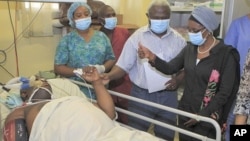The Economic Community of West African States (ECOWAS) is expressing concern about growing terrorism.
On Friday, a radical Nigerian Islamic group claimed responsibility for a car bombing that killed at least 18 people at the United Nations building in Abuja last Friday.
Sonny Ugoh, spokesman for ECOWAS, said the group is working with member countries and the U.N. to formulate a framework to combat terrorism. He described the bombing as a dastardly action.
“It is unacceptable, it is condemnable and it is not the best instrument to conduct dialogue with [the] government,” said Ugoh.
After the attack, a spokesman for the militant Islamic Boko Haram group telephoned a VOA correspondent in Nigeria, claiming his group carried out the bombing. He also warned, “This is just the beginning.” He said the attack was in response to the military's increased presence in northeastern Borno state, where Boko Haram is active.
Boko Haram is blamed for scores of bombings in recent months, but Friday's attack marks a shift beyond domestic targets.
Terrorism
Last week, General Carter Ham, commander for the United States African Command (AFRICOM), said there are indications of Boko Haram contacts with al-Qaida.
His comments came after some experts expressed concern about terrorist activities in West Africa.
Critics say ECOWAS has done very little to combat the threat, and cite recent attacks in Mali, Niger and Nigeria as evidence of the failure. Ugoh disagrees but sees in the examples a “worrying” trend.
“We are working to strengthen our mechanisms corresponding to these kinds of activities,” said Ugoh. “A couple of weeks ago, there was a meeting of civil society and the media to look at the instruments we are developing to…come [up] with [a solution] that would be sufficiently comprehensible to address …. terrorism.”
Combating terrorism
Experts and civil society groups have mounted campaigns to put more pressure on African institutions and regional organizations to come up with an appropriate response.
Ugoh said ECOWAS is working with the U.N. to combat terrorist activities.
“For us this is a new area, and the U.N. has of course more experience in this area. We are trying to work with the U.N. so that we can integrate the best practices to combat this challenge,” said Ugoh.
In May, ECOWAS organized a forum where UN anti-terrorism experts briefed its officials about ways to be better equip themselves against terrorism. The forum, according to ECOWAS paved the way for a mechanism to help coordinate its anti-terrorism efforts and harmonize policies.




